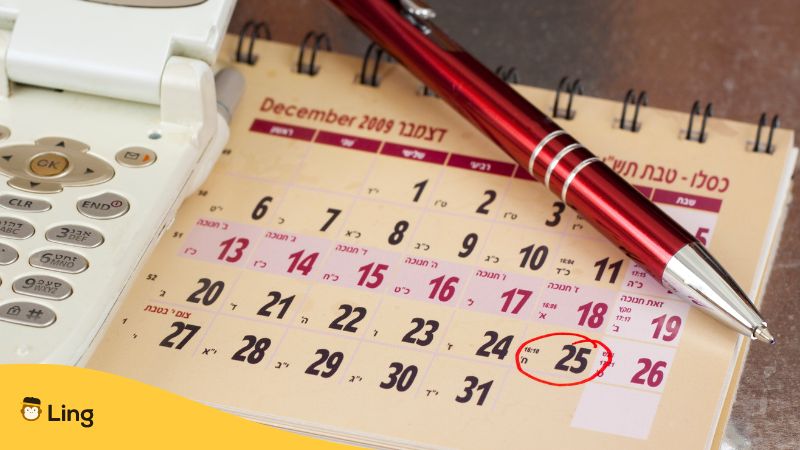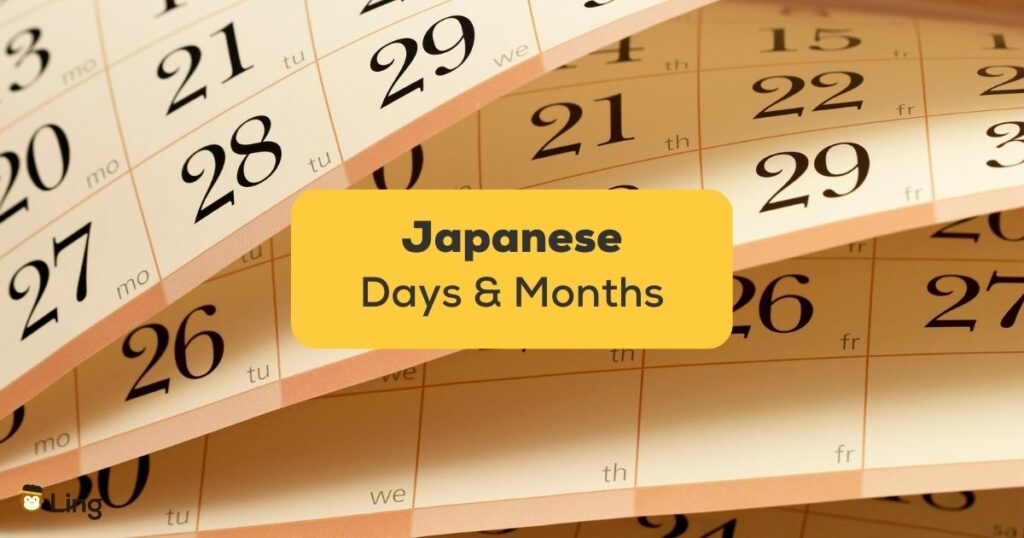Wondering about the terms related to Japanese days and months? We can’t blame you! You know, calendars or カレンダー (pronounced as Karendā) are more than just a tool to keep track of dates and events. They tell a story about the people and culture that use them.
Japan’s calendar is no different—it’s a rich tapestry woven from centuries of tradition and history. Sounds super exciting, right? Let’s learn all the Japanese words related to this topic in this comprehensive guide!
Japanese Days And Months
In the following sections, we’ll dive deeper into the unique names of the days and months. Trust me, it’s a journey worth taking. Shall we proceed?
Whether you’re a budding linguist, an ardent anime fan, planning a trip to Japan, or just curious about this beautiful language, this journey promises to be an exciting one. In this section, we’ll traverse the landscape of Japanese days, soaked in cosmic symbolism, and navigate the simplicity and logic of the Japanese months.
So, tighten your seatbelt because this linguistic adventure is about to take off! Ready to time-travel through the Japanese calendar? Let’s go!

Days In Japanese
Alright, buckle up, my friend! We’re going on a little linguistic adventure. Now, imagine we’re explorers discovering the days of the week in a whole new world: the world of the Japanese language. Let’s take a closer look at these daily terms, shall we?
| English | Japanese (Hiragana) | Romanization | Pronunciation |
|---|---|---|---|
| Monday | げつようび | Getsuyōbi | |
| Tuesday | かようび | Kayōbi | |
| Wednesday | すいようび | Suiyōbi | |
| Thursday | もくようび | Mokuyōbi | |
| Friday | きんようび | Kin’yōbi | |
| Saturday | どようび | Doyōbi | |
| Sunday | にちようび | Nichiyōbi |
Ling has a better way to help you memorize these words with ease. How about giving it a shot? Download it now from the App Store or Play Store to get started!
The beauty of Japanese days of the week lies in their deep-rooted meanings. Apart from knowing how to tell the time in Japanese, you also need to know their symbolisms. You see, each day is tied to nature and the cosmos, which, honestly, makes every day sound quite magical when you think about it.
- Monday – or as the Japanese say, げつようび (Getsuyōbi). The character 月 (getsu) represents the moon. That’s right, Monday is the moon’s day. Now, doesn’t that make Mondays sound a little more enchanting?
- Tuesday – in Japanese, it’s かようび (Kayōbi). Here, 火 (ka) stands for fire. Suddenly, Tuesday isn’t just another day after Monday; it’s a fiery beacon lighting up the start of your week.
- Wednesday – or すいようび (Suiyōbi), comes from the word 水 (sui), meaning water. It’s a day of flow, maybe a bit of calm amidst the bustle of the week.
- Thursday – もくようび (Mokuyōbi) is interesting. The term 木 (moku) represents wood or a tree. You can imagine the wisdom and steadiness of a tree on this day, can’t you?
- Friday – きんようび (Kin’yōbi) carries the character 金 (kin) for gold or metal. As the end of the workweek for many, Friday truly is golden, isn’t it?
- Saturday – Moving into the weekend, we have 土ようび (Doyōbi). The symbol 土 (do) stands for earth or soil. Just like Earth, Saturday is grounding, a day for rest and rejuvenation.
- Sunday – Last but definitely not least, we have 日ようび (Nichiyōbi). The character 日 (nichi) represents the sun. As the day of rest and recreation, it’s fitting that Sunday aligns with the warm and radiant sun, right?
Isn’t that something? Each day of the week in Japanese isn’t just a name; it’s a symbol, a connection to the cosmos and nature around us. This spiritual and poetic aspect is a lovely reflection of the Japanese language and culture. So, how about that? Ready to start seeing your week in a new, magical light?

Months In Japanese
Compared to the cosmic adventure we had with the days of the week, the months might seem a tad bit straightforward. But, hey, there’s a charm in simplicity, too!
At first glance, it might look like the Japanese took a shortcut when it came to naming the months. They simply numbered them from one to twelve. But hold on, let’s not jump to conclusions. There’s a certain elegance and logic to this simplicity, don’t you think? It’s very efficient and practical – classic Japanese traits.
For instance, January is ‘Ichigatsu,’ which translates to ‘first month,’ and this pattern continues all the way to December, ‘Jūnigatsu,’ meaning ‘twelfth month.’ Simple, efficient, and neat, just like the Japanese culture.
So, how about it? Ready to tackle the calendar in Japanese? With a little practice, you’ll have the days and months down in no time!
What Is The Japanese Calendar Today?
In ancient times, Japan adopted a lunisolar calendar similar to the one used by the Chinese. It was a bit of a complex system that was based on the cycles of the moon and the sun. Can you imagine the moon dictating the rhythm of the seven days and 12 months? Quite a picturesque idea, right?
But as romantic as that sounds, the system had its challenges. It was tricky to keep up with the shifting dates that resulted from syncing with the moon’s cycles. Imagine trying to keep your schedule straight when the date of the New Year changes every year!
So, in 1873, during the Meiji era, Japan decided it was time for a switch and adopted the Gregorian calendar. Yes, the same one you and I use today. They kept the seven-day week format, and each day and month got its own unique name.
The Japanese calendar today is a blend of the old and the new. It mirrors the country’s rich history while keeping pace with the modern world.
Learn Japanese With Ling
Interested to learn Japanese?
Oh, you’re in for a treat!
If you’re looking to expand your Japanese linguistic prowess, there’s this fantastic resource I want to share with you. Meet Ling, a language learning app that’s like a friendly, always-available language tutor right in your pocket!
Ling is more than just a regular language app. Think of it like a playground for language learners, a place where you can play, experiment, and learn at your own pace. It’s highly interactive and uses a variety of techniques like quizzes, games, and even a chatbot to keep things fresh and engaging. You’ll find yourself practicing vocabulary, sentences, and even having full-blown conversations in Japanese. All while having fun!
But that’s not all. Ling also offers real-world scenarios and practical conversations, so you’ll be ready to navigate the streets of Tokyo or order sushi like a pro. And guess what? It’s available around the clock. So, whether you’re a night owl or an early bird, Ling is ready for a language workout whenever you are.



































































